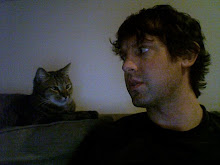Romantic comedies have been on a steady decline. Unless you're Judd Apatow, you're lucky to balance the gender ratio to a scant 30/70. Luckily movies like (500) Days of Summer come around to prove that you can maintain the footholds of a love story (or "not a love story" as it's advertised) without completely alienating the manlier of the theater-fill.
Summer tells the story from the male point of view, but conveys a tale that we've all been a part of. Joseph Gordon-Levitt plays Tom Hansen, an architecture graduate that's settled for a job as a greeting card writer. Opposite him, Zooey Deschanel plays Summer Finn, the temp that he inexplicably falls for. The film flip-flops through the 500 day timeline that is the beginnings and endings of their togetherness. The feelings on both sides of the narrative (Tom's and Summer's) resonate with anyone who's ever been in or on the verge of a serious relationship.
Writer Scott Neustadter used two failed relationships as the template for Summer (both in story and character) and it's plainly obvious that this is a quasi-autobiographical account as soon as the opening, pre-credits titles fade their way onto the screen. The unconventional use of a non-linear timeline ensures that the roller coaster of Tom's emotions never becomes stale or uninteresting. Summer's wardrobe dressed her in a very nouveau-classic attire that recalls a modernized version of classic 50's era looks, coupled with some brilliant IKEA scenes creating the ideal marriage fantasy in Tom's mind. Each scene plays out to just the right length, neither cut too short or outstaying its welcome. Director Marc Webb, who boasts an astounding number of music video credits, transitions seamlessly into the world of feature length film. Though, music is clearly an integral part of the story and pace set to (500) Days. With a soundtrack laced with the now legendary tunes of The Smiths and more contemporary indie rock acts like Wolfmother and The Doves, Summer manages to steer clear of being too "hipster" by being utterly genuine in its execution.
The cast glides through the film with ease. Never once is anyone's performance unbelievable or insincere. Joseph Gordon-Levitt proves yet again that this is the genre that he flourishes in, as the latter day Rob Gordon (of High Fidelity notoriety, Rob Fleming if you're going by the novel and really the only major difference is the shift from London to Chicago.) His previous endeavors as the down and out high school "private eye" Brendan in Rian Johnson's debut film, Brick and the mentally damaged patsy Chris Pratt in the underappreciated psychological heist picture, The Lookout reintroduced him as the familiar face (from 3rd Rock from the Sun, 10 Things I Hate About You) with an astounding range, but seeing a smile cross his face recalls that his comedic roots are still intact. Zooey Deschanel finally works her way out of the slump of her preceding films, The Happening and Yes Man, with a character with some... well, character.
Having wowed audiences at both Sundance and Cannes this year and seeing a decently expanded theatrical run, (500) Days of Summer should pose as the template for any and all future comedy projects that hope to exude some form of romantic sentimentality, whether that romance is long term or not. Thematically poignant and genuinely relatable and humorous, this is likely the best anti-romantic comedy since 2000's High Fidelity or at least the best representation of how romance has changed for the hipster generation.





